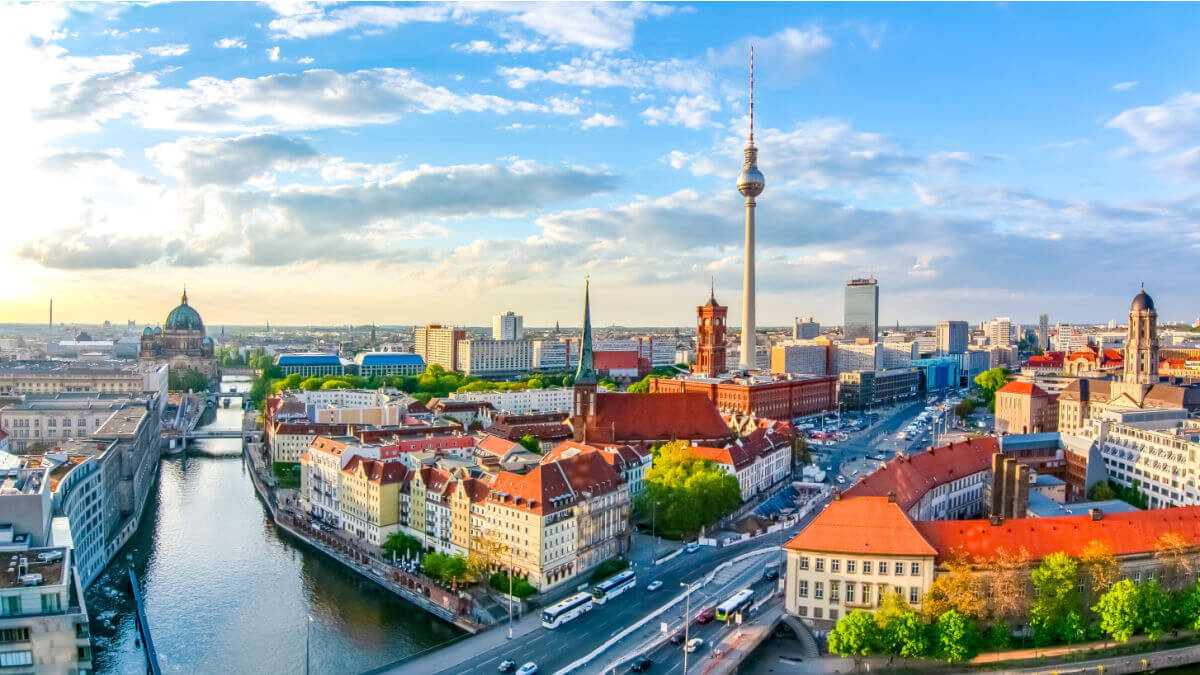How to transfer UK pension to Germany
Read our helpful guide on how to transfer a UK pension to Germany, including the steps, fees and taxes involved.

Germany is Europe’s economic powerhouse, so it's no surprise that many expats arrive here to pursue job opportunities in one of the major cities. However, with world class universities, which in most cases offer free tuition, it’s also the perfect place to come as an international student to complete your studies. Finally, with some cities offering pleasingly low costs of living with excellent amenities and infrastructure, retiring in Germany is also an increasingly popular choice for foreigners.
Whether you’re retiring, going to work, temporarily relocating, or moving to Germany for good, it’s helpful to have a picture of what life there will cost as an expat. Here’s a quick guide.
The official currency in Germany is the Euro (EUR or € on currency exchanges).
You can find out the exact value of your money in EUR, using an onlinecurrency converter - but here’s a rough guide:
| Comparing basic cost of living | 1 bedroom flat in city centre (monthly rent) | Lunch for 2 (3 courses, mid range restaurant) | Transportation (monthly pass) |
|---|---|---|---|
| Berlin, Germany | EUR 739 | EUR 40 | EUR 81 |
| Munich, Germany | EUR 1,030 | EUR 50 | EUR 65 |
| London, UK | EUR 1,919 | EUR 62 | EUR 149 |
| New York City, USA | EUR 2,675 | EUR 67 | EUR 105 |
| Sydney, Australia | EUR 1,757 | EUR 54 | EUR 109 |
One major factor that adds expense for expats in Germany, is the cost of converting cash to EUR from your home currency. Even if your bank says it offers fee-free money exchange, you can be sure that its cut is rolled up in the exchange rate it uses. To get the best deal, you should use an exchange service like Wise, which applies the same rate you’ll find on Google. With a quick service, and low flat fees to transfer your cash, this can be a much better deal than relying on your home bank.
The costs of living in Germany are fairly reasonable compared to other European countries. However, there’s significant variance between individual cities, with the capital Berlin actually far cheaper for rent and daily expenses than other cities such as Munich. If you're on a fixed income, however, it's good to know that a great life in Germany could be even cheaper if you move away from the big cities.
| Living expenses in Germany (excluding rent) | Berlin average cost | Munich average cost |
|---|---|---|
| Single person, per month | EUR 733 | EUR 799 |
| Single person, per year | EUR 8,796 | EUR 9,588 |
| University student, per month | EUR 588 | EUR 613 |
| 4 person family, per month | EUR 2,497 | EUR 2,747 |
| 4 person family, per year | EUR 29,964 | EUR 32,964 |
Salaries in Germany are above average with IT and engineering roles among the best paid choices in Berlin. However, reflecting the higher cost of living, Munich has higher salaries on average than the capital. With an emerging startup and tech scene, the focus in Munich is also on IT and engineering based professions. In fact, Munich is home to the 15th best paid QA engineers in the world. For reference, the figures below are for the capital, Berlin. Check out what you could earn, here:
| Salary averages for Germany | Average annual salary |
|---|---|
| Cashier | EUR 13,316 |
| Copywriter | EUR 37,349 |
| Financial analyst | EUR 47,023 |
| Graphic designer | EUR 28,179 |
| Mobile developer | EUR 32,751 |
| Product manager | EUR 45,956 |
| Receptionist | EUR 19,131 |
| Software engineer | EUR 44,469 |
| Teacher | EUR 28,194 |
| Web developer | EUR 35,392 |
One of the major factors determining how expensive life in Germany will be for you, is where you choose to live. Berlin offers low rents, despite its status as a major European capital - although prices are now rising rapidly here too.
Most of Germany’s major cities have excellent public transport facilities, which allow people to live outside of the city and commute easily for work. This widens the choice of accommodation significantly. Naturally, if you move outside of the big cities, you can rent in Germany for even less. See what it might cost you here:
| Renting in Germany | Average monthly cost (Berlin) | Average monthly cost (Munich) |
|---|---|---|
| One bedroom apartment (city centre) | EUR 739 | EUR 1,030 |
| One bedroom apartment (outside of city centre) | EUR 548 | EUR 790 |
| Three bedroom family home (city centre) | EUR 1,439 | EUR 1,950 |
| Three bedroom family home (outside of city centre) | EUR 1,050 | EUR 1,456 |
| Internet | EUR 25 | EUR 24 |
| Utilities (gas, electric and water for a 85m2 apartment) | EUR 232 | EUR 242 |
The German healthcare system is very strong. It's compulsory for all citizens and residents to have either public or private health insurance, which is often provided in part through your employer. Having private health insurance can mean you get access to services quicker than you might through the public system.
| Healthcare service | Average cost to you |
|---|---|
| Family doctor check-up | EUR 62 |
| Cold medicine for 6 days | EUR 6 |
| Antibiotic prescription | EUR 7 |
The cost of travel in the major cities in Germany is very reasonable. In fact, across most of Germany you'll find a very strong public transportation system if you prefer not to drive, but instead need to commute to a job in one of the towns or cities.
| Transportation and vehicle prices for Germany | Average cost |
|---|---|
| Gasoline (1 litre / 0.25 gallon) | EUR 1.33 |
| Monthly bus/transport pass | EUR 81 |
| Bus ticket, single use | EUR 2.70 |
| Taxi tariff, 8km/5mile journey | EUR 20 |
| Toyota Corolla, new | EUR 18,023 |
| VW Golf, new | EUR 18,269 |
From 2014 it has been free to study at all German public universities - for both home and international students. All you had to pay was some admin costs. However, the costs of this programme are currently under review, and some states are planning on reintroducing fees for non EU students in the near future.
| School | Average cost |
|---|---|
| Preschool / kindergarten (monthly fee) | EUR 60 |
| Private school for lower grades (annual) | EUR 16,000 |
| University tuition | Currently free - however costs to non EU students are under review |
Whether it's an exuberant Oktoberfest or a magnificent Bavarian castle, most people have a mental image of Germany. Few, however, really know how much there is on offer in this large and varied country. In fact, you can still find yourself ‘off the beaten track’ here in this very heart of the EU. This makes Germany a great expat destination, whether you’re considering a permanent move, or just looking to spend a year or two exploring somewhere new.
Good luck with your new life in Germany!
*Please see terms of use and product availability for your region or visit Wise fees and pricing for the most up to date pricing and fee information.
This publication is provided for general information purposes and does not constitute legal, tax or other professional advice from Wise Payments Limited or its subsidiaries and its affiliates, and it is not intended as a substitute for obtaining advice from a financial advisor or any other professional.
We make no representations, warranties or guarantees, whether expressed or implied, that the content in the publication is accurate, complete or up to date.

Read our helpful guide on how to transfer a UK pension to Germany, including the steps, fees and taxes involved.

Thinking of taking the leap and moving to Germany? You’re not alone, since over 80,000 Brits already call Germany their home.¹ If you like living in a stable...

A guide that explains the German residence permit, how it works, who can apply, how to apply and costs.

Are you or your partner expecting? While this is meant to be a very exciting time in your life, sometimes medical expenses and navigating public or private...

Holidays in Germany are celebrated differently than in many parts of the world. Germans take their holidays very seriously, with celebrations that are steeped...

Germany is so much more than sausages and beer. The country boasts incredibly low unemployment, a high quality of life, and a wonderful mix of history,...